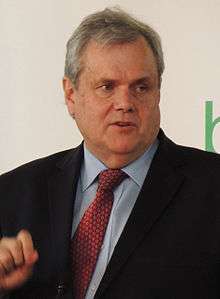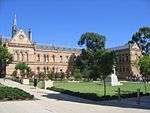Institute for Mineral & Energy Resources
The Institute for Mineral & Energy Resources (IMER) is the point of contact at the University of Adelaide for strategic research interests related to mineral and energy resources.[1] It was founded in 2009 and launched h Australian Minister for Mineral Resource Development, Paul Holloway on 5 October 2010.[2] The institute attracted over $18.5 million in research funding and corporate sponsorship in its first year.[3] The IMER facilitates collaborative research between the higher education sector and industry[4] and can take the shape of project collaboration to meet a company's specific needs, consultancy utilising academic researchers and PhD students, organisational collaboration to leverage government funding and long-term partnerships offering mutual benefits.[5]
Major projects
In 2012, the institute was awarded over 1.5million as part of the Australian Research Council's Industrial Transformation Program. Funds will be spent over six years during the establishment of a research hub for advancing copper-uranium production. BHP Billiton partnered with IMER on the project and is providing $2.5 million in cash plus additional in-kind contributions.[4]
Cooperative Research Centres
The University of Adelaide also houses three Cooperative Research Centres (CRCs) which interact with IMER, its staff and its research projects. The CRC for Greenhouse Gas Technologies focuses on carbon capture and storage technology and the Energy Pipelines CRC focuses technology and processes for the maintenance and extension of existing natural gas pipelines and future pipeline needs. The Deep Exploration Technologies CRC focuses on developing cheaper, safer and more effective methods for drilling, analysis and targeting of deep mineral deposits. The latter CRC has been funded in excess of AUD$145 million through a combination of Federal government grants and corporate sponsorship, making it the "world’s best-supported independent research initiative in mineral exploration."[6]
Objectives
As of 2014 the objectives of IMER are to:[1]
- Advance science and technology to enhance prospecting, discovery and extraction of mineral and energy resources, including petroleum and geothermal resources
- Advance science and technology to lower costs and enhance cleaner energy generation, storage, transmission and utilisation of energy
- Increase energy efficiency and reduce the impact of industrial processes, especially in mining and mineral processing
- Maximise social and economic benefits of mineral and energy resource developments
- Advance the prevention, assessment and remediation of environmental impacts of mineral and energy resource developments
Advisory Board

The IMER Advisory Board contains members from the university, State government and private sectors. As of October 2014, board members are:[7]
- Andrew Stock - Horizon Oil Limited, Geodynamics Ltd and Clean Energy Finance Corporation
- Professor John Beynon - Faculty of Engineering, Computer and Mathematical Sciences, University of Adelaide
- Professor Mike Brooks - Deputy Vice-Chancellor (Research) and Vice-President, University of Adelaide
- John England - Director of Processing Studies and Technology Resource Planning and Development, BHP Billiton
- Professor Stephen Grano - Executive Director, IMER, University of Adelaide
- Paul Heithersay - Executive Director, Minerals and Energy Resources, Department of Primary Industries and Resources SA, Government of South Australia
- Professor Richard Hillis - Chief Executive Officer, Deep Explorations Technologies Cooperative Research Centre
- Belinda Robinson - Chief Executive, Universities Australia
.jpg)
Former members have included:
- Robert Kennedy, Beach Energy Limited (formerly Beach Petroleum)
- Professor Peter Dowd - Executive Dean, Faculty of Engineering, Computer and Mathematical Sciences, The University of Adelaide.
- Dr Stephen Forbes - Director, Adelaide Botanic Gardens
- Professor Robert Hill - Executive Dean, Faculty of Sciences, University of Adelaide
- Susan Jeanes - Australian Geothermal Energy Association Inc.
- Dean Dalla Valle, Uranium Australia, BHP Billiton[8]
- Dr Kevin Wills, Flinders Mines Ltd[8]
Sponsors
Notable companies and organisations which have financially supported IMER research projects include (but are not limited to):[9]
- Barrick Gold of Australia Ltd
- Beach Energy Ltd
- Commonwealth Scientific and Industrial Research Organisation
- Chevron[3]
- Defence Science and Technology Organisation, Australian Federal Government
- ESSO Australia Pty Ltd
- ExxonMobil[3]
- Halliburton Energy Services Inc
- Iluka Resources
- Imperial Oil & Gas Pty Ltd
- Iron Road Ltd
- Newmont Mining Corporation
- OZ Minerals
- Rio Tinto Group[3]
- Santos Limited
- Shell Development Australia Pty Ltd
- Woodside Energy Ltd
- Xstrata Coal
References
- "About IMER". Institute for Mineral & Energy Resources. The University of Adelaide. Archived from the original on 19 October 2014. Retrieved 9 October 2014.
- "Bringing mining and energy together for society gain". CampusDaily.com.au. 5 October 2010. Archived from the original on 17 October 2014. Retrieved 10 October 2014.
- "Inaugural report 2009-2010" (PDF). Institute of Mineral & Energy Resources. University of Adelaide. 2010. Archived from the original (PDF) on 19 October 2014. Retrieved 10 October 2014.
- "Industrial transformation research hub for IMER". Institute for Mineral & Energy Research. University of Adelaide. 2012. Archived from the original on 19 October 2014. Retrieved 9 October 2014.
- "Working with industry". Institute for Mineral & Energy Resources. University of Adelaide. Archived from the original on 19 October 2014. Retrieved 10 October 2014.
- "What is DET CRC?". Deep Exploration Technologies CRC. Retrieved 10 October 2014.
- "The IMER Board". Institute of Mineral & Energy Resources. University of Adelaide. Archived from the original on 17 October 2014. Retrieved 9 October 2014.
- "Resources for a sustainable future" (PDF). Institute of Mineral & Energy Resources. University of Adelaide. 2010. Retrieved 9 October 2014.
- "Our Sponsors". Institute for Mineral & Energy Resources. University of Adelaide. Archived from the original on 19 October 2014. Retrieved 10 October 2014.
